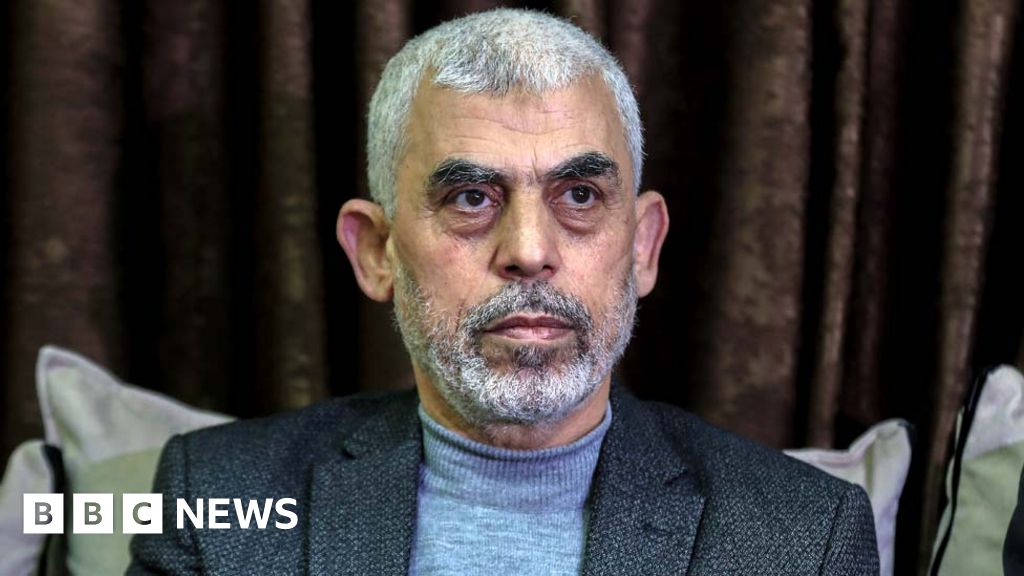The Israeli military has said it is investigating if its forces in Gaza Strip have killed Hamas chief Yahya sinwar, the architect of the 7th October 2023 attack against Israel and the most wanted man in the country.
Sinwar, who had striking snow-white eyebrows and snow-white hair, disappeared at the beginning of the war that was sparked by this attack in which 1,200 people died and 251 were taken hostage.
It was not surprising that thousands of Israeli soldiers, backed by drones and electronic eavesdropping equipment, as well as human informants, were trying to find his location.
“Yahya sinwar is the commander…and he is dead,” declared Israel Defense Forces’ (IDF) spokesperson Rear Admiral Daniel Hagari shortly after the attack against Israel.
Herzi Halevi, Chief of Staff IDF, said: “This abominable act was planned by Yahya sinwar.” “He and all those who are under him, therefore, are dead men on the streets.”
Mohammed Deif, leader of Hamas’s military wing Izzedine al-Qassam Brigades and the IDF claimed he was killed in a July air strike in Gaza.
More on the Israel-Gaza War
Follow live: Latest Updates
Analysis: Bowen – Year of killings and broken assumptions has brought Middle East to the edge of a deeper, wider war
Gaza map: A year of war has changed the landscape dramatically
Hamas’s hostage-taking stories from Israel explained
Hugh Lovatt is a senior policy fellow with the European Council on Foreign Relations. He believes that Deif was behind the 7 October attack, because it was a military action. However, Sinwar would have “likely” been influenced by and part of whoever planned it.
Before Thursday’s announcement the IDF believed Sinwar had been cornered underground, hiding in tunnels beneath Gaza with his bodyguards and communicating with very few other people for fear his signal would be tracked and found.
He was still named Hamas’s overall leader after the assassination in Tehran of Ismail Hanieyh, in July. He was also reportedly in touch with Qatari Hamas officials who were involved in negotiating an agreement for a ceasefire to release hostages earlier this month.
Arrests and upbringing
Sinwar, also known as Abu Ibrahim (61), was born in Khan Younis, a refugee camp located at the southern end the Gaza Strip. His parents were originally from Ashkelon, but they became refugees following what Palestinians refer to as “al-Naqba”, or the Catastrophe – the mass displacement in Palestine of Palestinians after the founding of Israel in 1948.
He graduated from the Khan Younis Secondary Boys School and then received a Bachelor’s Degree in Arabic Language from the Islamic University of Gaza.
Ehud Yari, a fellow at the Washington Institute for Near East Policy who interviewed Sinwar four times in prison, said that Khan Younis had been a “bastion” for support for the Muslim Brotherhood.
Yaari says that the Islamist group was “a massive movement of young people going to mosques in poverty of the refugee camps”, and that it would later take a similar significance for Hamas.
Sinwar was arrested in 1982 by Israel for “Islamic Activities” at the age of 19. He was arrested again in 1985. Around this time, he gained the trust of Hamas founder Sheikh Ahmed Yassin.
Kobi Michael, senior researcher at Tel Aviv’s Institute for National Security Studies, says that the two became “very close”. Michael says that this relationship with the spiritual leader of the organisation would give Sinwar an “halo effect” in the movement.
He established the feared internal security organization of Hamas, al-Majd, two years after its founding in 1987. He was only 25.
Al-Majd was notorious for punishing those accused with so-called moral offences. Michael claims he targeted shops which sold “sex videos”, as well as hunting and killing anyone suspected to be collaborating with Israel.
Yaari claims he was responsible of numerous “brutal killings”, of people suspected of cooperating with Israel. “Some of them were done by his own hands, and he was very proud of it. He talked about it to me and others.”
According to Israeli officials he confessed that he had punished a suspected informant by having the man’s older brother bury him alive using a spoon rather than a spade.
Yaari says, “He’s the type of man who can attract followers and fans as well as many who are afraid of him. They don’t want a fight with him.”
Sinwar is accused of planning the kidnapping and killing of two Israeli soldiers in 1988. He was arrested in the same year and convicted by Israel of the murder of twelve Palestinians. He received four life sentences.
The prison years
Sinwar spent 22 years of his adult life in Israeli prisons between 1988 and 2011. His time in Israeli prisons, including some time spent in solitary confinement appears to have radicalised Sinwar even more.
“He was able to impose his authority with force and ruthlessness,” says Yaari. He established himself as the leader of the prisoners by negotiating with the prison authorities on their behalf and enforcing the discipline among inmates.
A prison assessment by the Israeli government described Sinwar’s character as “cruel and authoritative, with unusual endurance abilities, cunning and manipulative and content with little”. Keeps secrets, even amongst fellow prisoners. Has the ability of carrying crowds.
Yaari’s assessment, based on the many times they had met, was that Sinwar is a psychopath. “But to say about Sinwar that ‘Sinwar’s a psychopath’ is a mistake”, he says. “Because then you’ll miss this strange, complicated figure”.
Yaari describes him as “extremely cunning and shrewd” – a man who knows how to turn on and off his personal charm.
When Sinwar told him that Israel must be destroyed, and that there was no room for Jews in Palestine, “he would jokingly say, ‘Maybe, we’ll make an exemption for you'”.
Sinwar became fluent in Hebrew while incarcerated by reading Israeli newspapers. Yaari says that Sinwar preferred to speak Hebrew even though Yaari is fluent in Arabic.
Yaari says, “He wanted to improve his Hebrew.” “I think he was looking for someone who spoke higher Hebrew than prison wardens.”
Sinwar was freed in 2011 as part a deal in which 1,027 Palestinians and Israeli Arabs were released from prison in exchange for one Israeli hostage: the IDF soldier Gilad Shalit.
Shalit was held captive for 5 years after being taken by Sinwar’s older brother, a Hamas senior military commander. Sinwar has called for more kidnappings.
Hamas had won the election and eliminated its rivals Yasser arafat’s Fatah by throwing them off tall buildings.
Brutal discipline
Michael says that when Sinwar returned to Gaza he was instantly accepted as a leadership. Michael says that his reputation as a founding Hamas member who had spent so many years in Israeli prisons was a major factor.
Michael adds that “people feared him because he was a man who murdered people with his own hands”. “He was brutal, aggressive, and charismatic all at once.”
Yaari says, “He’s no orator.” “When he speaks in public, he sounds like someone from the Mob.”
Yaari says that Sinwar formed an alliance with Izzedine al-Qassam Brigades chief of staff Marwan Issa immediately after he left prison.
In 2013, he became a member of the Hamas Political Bureau for the Gaza Strip before becoming its leader in 2017.
Sinwar’s younger sibling Mohammed played a prominent role in Hamas. He claimed that he survived several Israeli assassination efforts before Hamas pronounced him dead in 2014. Since then, media reports have surfaced claiming that he is still alive and active in Hamas’s military wing. He may have even played a role in the 7 October attack.
Sinwar’s reputation as a brutal and violent man earned him the nickname The Butcher of Khan Younis.
“He’s someone who imposes brutal disciplines,” says Yaari. “People knew and still know that if you don’t obey Sinwar, your life is at risk.”
He is said to be responsible for the detention, torture, and murder in 2015 of a Hamas leader named Mahmoud ISHTIWI who was accused of embezzlement or homosexuality.
In 2018, he told the international media that he supported thousands of Palestinians who wanted to break through the fence separating Gaza Strip from Israel in protest of the US moving their embassy from Tel Aviv, to Jerusalem.
Later that same year, he claimed he had survived an assassination by Palestinians loyal the rival Palestinian Authority in the West Bank.
He has also shown periods where he was pragmatist, supporting temporary ceasefires, prisoner swaps, and reconciliation with the Palestinian Authority. Michael claims that he was even criticized by some opponents for being too moderate.
Closeness to Iran
Many in Israel’s security and defence establishment believe that it was a grave mistake to let Sinwar out as part of the exchange of prisoners.
Israelis believe they were lulled to a false sense if security by the mistaken belief, that by offering Hamas more economic incentives and work permits, it would have reduced the movement’s appetite for war. This was a catastrophic mistake.
Yaari says, “He believes he is the one who will liberate Palestine. He doesn’t care about the economic situation or social services in Gaza.” “It’s him.”
In 2015, the US State Department classified Sinwar as a “Specially Defined Global Terrorist”. In May 2021, Israeli airstrikes hit his Gaza Strip home and office. In April 2022 he urged people to attack Israel using any means possible in a televised speech.
Analysts have identified him a key figure in Hamas’s political office and its armed wing Izzedine al-Qassam Brigades that led the attacks on southern Israel on October 7th.
On 14 October 2023 an Israeli military spokesperson, Lt Col Richard Hecht called Sinwar the “face of evil”. He added: “That person and his entire team are in our sights.” We will find that man.
Sinwar has also developed a close relationship with Iran. It is not obvious that a Shia nation and a Sunni Arab organization would form a partnership, but they both share the same goal of ending Israel and “liberating” Jerusalem from Israeli occupation.
They have become one. Iran funds, trains, and arms Hamas. This helps it build up its military capability and amass a large arsenal of rockets that it uses to attack Israeli towns.
In a speech delivered in 2021, Sinwar expressed his appreciation for the support. “Without Iran, the Palestinian resistance would not have its current capabilities.”
Lovatt says that killing Sinwar is more of a PR victory for Israel, than it will have on the movement.
Non-state organizations tend to function like a hydra head: one leader or operational commander is removed and quickly replaced by another. The successor may not have the same experience or credibility, but the organisation can still regenerate in some form.
Lovatt says that “clearly, he’d be a loss, but he’d be replaced, and there are structures to do this.” It’s not the same as killing Bin Laden. “Hamas has other senior political and army leaders.”
The bigger question is: What happens to Gaza after Israel ends its military campaign against Hamas? And who will be in charge at the end of it all?
Can they stop it from becoming a launchpad once again for attacks against Israel, triggering massive retribution in return?
Additional reporting by Jon Kelly
Read More @ www.bbc.com




